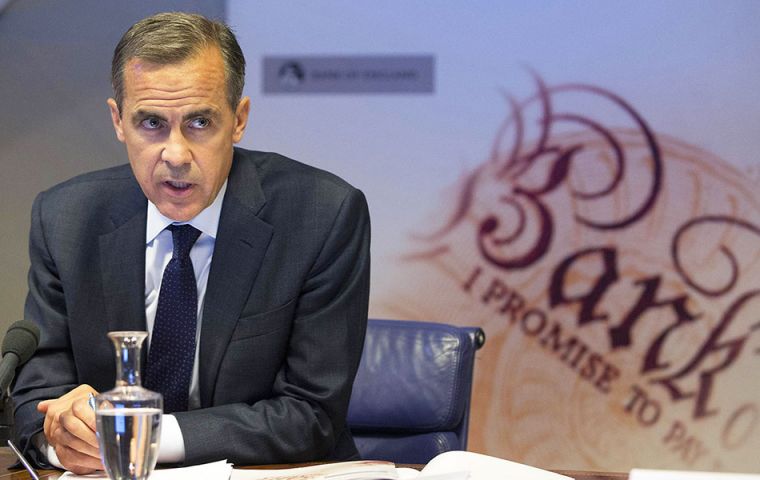MercoPress. South Atlantic News Agency
UK and US fine Lloyds group £218m for manipulating the Libor rate
 Bank of England Governor Mark Carney called such misconduct “reprehensible”.
Bank of England Governor Mark Carney called such misconduct “reprehensible”. Lloyds Banking Group has been fined £218m for “serious misconduct” over some key interest rates set in London. The group manipulated the London interbank offered rate (Libor) for yen and sterling and tried to rig the rate for yen, sterling and the US dollar, said the US legal order.
It also manipulated submissions for another short-term rate linked to the value of UK government debt.
Bank of England Governor Mark Carney called such misconduct “reprehensible”.
Lloyds said it “condemns the actions of the individuals responsible”.
The fines were issued by the UK-based Financial Conduct Authority (FCA) and a US-based trading commission.
A “novel” development, setting the bank aside from competitors that have already been fined for Libor-rigging, was its abuse of the government-backed Special Liquidity Scheme, said the FCA.
The FCA fined Lloyds £105m. It said the fine was the “joint third-highest ever imposed” by the organization or its predecessor, the Financial Services Authority.
Bank of England Governor Mr Carney said in a letter dated 15 July to Lloyds' chairman Lord Blackwell that the attempted manipulation could lead to criminal action against those involved.
“Such manipulation is highly reprehensible, clearly unlawful and may amount to criminal conduct on the part of the individuals involved,” Mr. Carney wrote.
Lord Blackwell replied on 16 July: “This was truly shocking conduct, undertaken when the bank was on a lifeline of public support.”
In the US, the Commodity and Futures Trading Commission fined the group, which is responsible for Lloyds Bank and the Bank of Scotland, 105m dollars, while the US Department of Justice fined it 86m.
The agreement is the seventh joint penalty handed out by US and UK regulators in connection with Libor and other benchmarks, used to price around 450trn of financial products around the world.
Barclays and the Royal Bank of Scotland have previously paid 453m and 612m in fines related to the scandal. Part of the FCA's fine for Lloyds, was for serious misconduct over a program introduced during the financial crisis to help the banks.
The Special Liquidity Scheme (SLS) was set up in 2008 by the Bank of England to let banks temporarily swap assets that were difficult to trade.
In a statement, the watchdog said the “manipulation of the repo rate benchmark in order to reduce the firms' SLS fees” was misconduct of a type “not seen in previous Libor cases”.
The lower the repo rate of a bank the lower the fees for using the SLS program. Lloyds was also by far the biggest user of the scheme, said the BBC's Business correspondent Simon Jack.
Tracey McDermott, the FCA's director of enforcement and financial crime, said that Lloyds and Bank of Scotland was a “significant beneficiary” of financial assistance from the Bank of England through the SLS.
“Colluding to benefit the firms at the expense, ultimately, of the UK taxpayer was unacceptable.
”This falls well short of the standards the FCA and the market is entitled to expect from regulated firms,“ she said adding other banks needed to learn lessons from and avoid the mistakes of their peers for trust to be restored in financial services.
The US trading commission said the ”unlawful conduct“ of Lloyds ”undermined the integrity“ of Libor, which it said was a critical global benchmark.
It said Lloyds had acted to benefit its trading positions and protect its reputation by manipulating the rate when it was in the process of buying HBOS during the crisis.
The commission released a transcript detailing examples of requests to manipulate the sterling and US dollar Libor rate.
They include an employee from Lloyds telling their counterpart at HBOS: ”Oh mate, I always have loads of loans going out at the end of the month so I always try to fix it higher“.
The trader added: ”They keep calling it lower... I can't work out why it is going down all the time... I will leave it at 67 and I won't go any lower, right?“
A sterling submitter at HBOS responded with: ”Yeah“.
And a Lloyds TSB junior trader asked a sterling submitter at HBOS: ”Do you want us to keep the Libor higher?“
The submitter answered: ”Yeah, I have a big liability fix, so as low as possible please.”





Top Comments
Disclaimer & comment rules-

-

-

Read all commentsGood @ the headline.
Jul 30th, 2014 - 08:38 am 0It would be more effective to fine the individual banksters involved and their immediate bosses and get them dismissed and barred from the financial services industry.
Jul 30th, 2014 - 09:00 am 0This cant be right. Only Argentina is capable of this kind of corruption.
Jul 30th, 2014 - 02:08 pm 0Commenting for this story is now closed.
If you have a Facebook account, become a fan and comment on our Facebook Page!